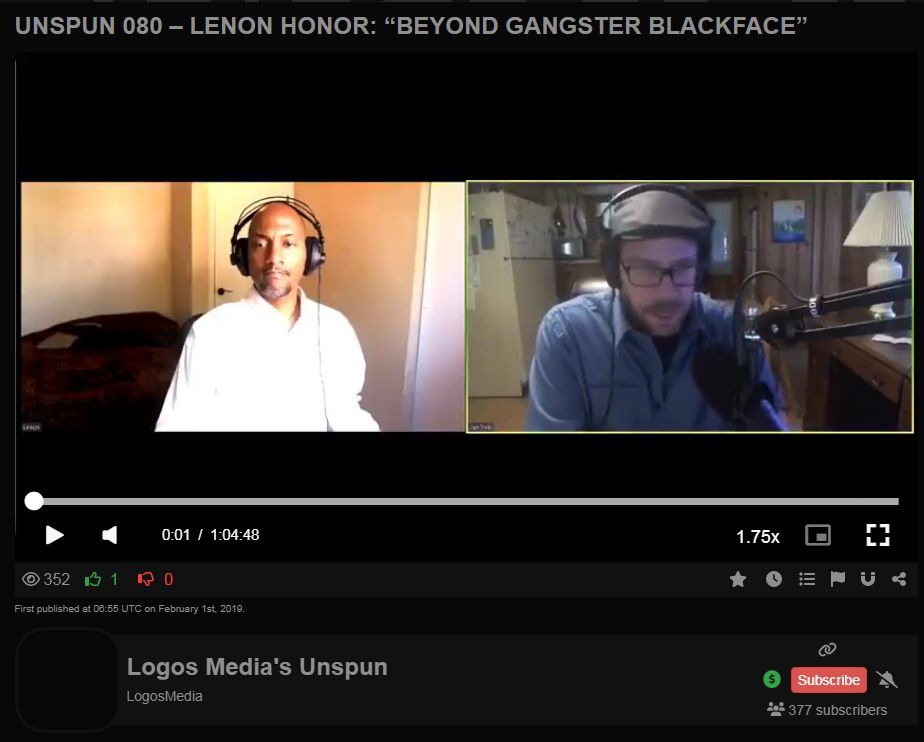Beyond Gangster Blackface
“An agenda to destabilize the family unit; putting forth degraded versions of men, women, mothers and fathers.”
https://www.bitchute.com/video/rz080QU5Ekwr
See also
https://www.bitchute.com/video/QT10LJvs0TkC

The term “beyond gangster blackface” refers to a concept introduced by filmmaker and cultural critic Spike Lee to critique certain portrayals of African American characters in mainstream media, particularly in film and television. Spike Lee used this term to describe what he saw as the perpetuation of negative stereotypes and caricatures of Black people, often portrayed by Black actors themselves.
Here are some key points to understand about the concept of “beyond gangster blackface”:
1. Origin: Spike Lee coined the term “beyond gangster blackface” in response to what he perceived as the limited and stereotypical roles available to Black actors in Hollywood. He argued that while Blackface minstrelsy—the practice of non-Black performers darkening their skin to portray exaggerated and demeaning caricatures of Black people—was no longer acceptable, similar stereotypes persisted in modern media, particularly in the portrayal of Black gangsters and criminals.
2. Critique of Media Representation: “Beyond gangster blackface” critiques the portrayal of Black characters as one-dimensional stereotypes, particularly in roles that emphasize criminality, violence, and dysfunction. Spike Lee argued that these portrayals reinforced negative stereotypes about Black people and contributed to systemic racism and social inequality.
3. Limited Opportunities: Spike Lee’s concept highlights the broader issue of limited opportunities for Black actors and filmmakers in Hollywood. He argued that the prevalence of stereotypical roles relegated Black performers to narrow, often degrading portrayals that failed to reflect the complexity and diversity of Black experiences.
4. Call for Authentic Representation: “Beyond gangster blackface” underscores the importance of authentic and diverse representation of Black characters in media. Spike Lee advocated for more nuanced and multifaceted depictions of Black people that reflect their humanity, resilience, and cultural richness.
5. Impact and Legacy: Spike Lee’s critique of “beyond gangster blackface” has had a lasting impact on discussions about race, representation, and diversity in media. It has sparked conversations about the responsibility of filmmakers and media creators to challenge stereotypes and promote positive and authentic portrayals of marginalized communities.
Overall, “beyond gangster blackface” serves as a powerful reminder of the ongoing need for greater inclusivity, representation, and equity in the entertainment industry, and it continues to inform discussions about race, identity, and representation in media today.
Lenon Honor is an author, filmmaker, and social commentator known for his work on issues related to African American culture, media representation, and social justice. He is the creator of the documentary series “Beyond Gangster Blackface,” which explores the historical roots and contemporary manifestations of negative stereotypes of African Americans in media and popular culture.
In “Beyond Gangster Blackface,” Lenon Honor delves into the concept coined by filmmaker Spike Lee and expands upon it, examining how Black people have been depicted in various forms of media throughout history and the impact of these representations on society. The documentary series explores the legacy of racial stereotypes and caricatures, such as the “coon” and “thug” archetypes, and their perpetuation in modern media.
Through interviews, archival footage, and analysis, Lenon Honor unpacks the ways in which negative stereotypes of African Americans have been reinforced and normalized in mainstream media, perpetuating harmful narratives and contributing to systemic racism and social inequality. He also explores the role of media manipulation and propaganda in shaping public perception and perpetuating harmful stereotypes.
“Beyond Gangster Blackface” is part of Lenon Honor’s broader body of work addressing issues of race, identity, and representation in media and popular culture. Through his documentaries, books, and online platforms, he seeks to raise awareness, challenge stereotypes, and promote positive images of African Americans and other marginalized communities.
Overall, Lenon Honor’s “Beyond Gangster Blackface” serves as a thought-provoking and critical examination of the ways in which media representations shape perceptions of race and influence social attitudes, and it contributes to ongoing discussions about the importance of authentic representation and diversity in media and popular culture.
